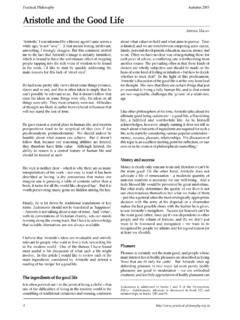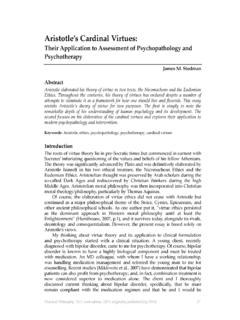Transcription of Key Thinkers in Practical Philosophy: Dr Irvin D. …
1 Practical philosophy March 2001. Key Thinkers in Practical philosophy : Dr Irvin D. Yalom Stephen James Minton Dr Irvin D. Yalom, Emeritus Professor of Psychiatry at Stanford University School of Medicine since 1994, was born in Washington, DC in 1931, of Russian emigrant parents. Since receiving his MD in 1956, his career has been one of varied and considerable honours; as well as being an extremely successful psychiatrist, and individual and group psychotherapist, he has received the Commonwealth Club Gold Medal Award for Fiction (1993) for When Nietzsche Wept, one of the two novels he has published. His eleven books include these two novels (he is currently working on a third, this time about Schopenhauer), five text books on psychiatry/psychotherapy (including the excellent Existential Psychotherapy'(1980) and the near legendary (amongst group psychotherapists) The Theory and Practice of Group Psychotherapy (first published in 1970, and now in its fourth edition (1995)), three books of semi-autobiographical tales of psychotherapy' (including the best-selling Love's Executioner (1990)), and an introduction to his own work, The Yalom Reader (1998).)
2 Additionally, he has authored over 60. articles, monographs and chapters. Yalom's written output, therefore, is considerable in bulk, and sometimes not far short of astonishing in breadth. He has made numerous and significant medical, literary, psychological and (probably most interesting to readers of this journal) applied philosophical contributions. For convenience's sake, I have chosen to group these contributions accordingly: (i) the practice of psychiatry and psychotherapy;. (ii) the development of existential psychiatry and psychotherapy;. (iii) literary contributions and innovations. As the former and latter categories have rather less to do with the application of Practical philosophy , I shall be brief here - however, to omit these areas entirely would be to misrepresent much of the general tone and scope of Yalom's work. The practice of psychiatry and psychotherapy Yalom has made numerous contributions to the teaching and practice of both group and individual psychotherapy.
3 Some of his writings concerning the above are more or less standard (but extraordinarily human, and well-written) textbooks, and two have enjoyed considerable commercial success on both sides of the Atlantic (Existential Psychotherapy (1980), and Theory and Practice of Group Psychotherapy' (4th Edition, 1995)). Both are excellent texts; the in-depth and exhaustive coverage of the latter has ensured that it has become something of a bible' for all group psychotherapists. Yet I. believe that Yalom is correct when he attributes at least some of the success to story- telling - to a stream of brief human vignettes running through the text' (Yalom, 2001). For it is in his books that address the practice of psychotherapy through the intensely reflective documentation of case studies those that Yalom refers to as his tales of psychotherapy' (as may be found in Love's Executioner (1989), Momma and the Meaning of Life (2000), and the early Every Day Gets A Little Closer (1974)) - his writing is at its most compelling.
4 The legendary existential psychotherapist Rollo May (in his own right, an excellent writer) commented on Love's Executioner that Yalom writes like an angel 40. Practical philosophy March 2001. about the devils that besiege us all'. Yalom, like most existential therapists, does not rely upon symptom-based diagnosis; instead, he focuses upon the very real, human encounter between himself and his client, and the relationship that builds between them during the course of psychotherapy. Yalom is meticulously attentive to his own feelings, conscious and unconscious, towards the client, and encourages the client to be equally attentive to her or his own feelings towards him. He says that: I have approached all of my patients with a sense of wonderment at the story that will unfold. I believe that a different therapy must be constructed for each patient because each has a unique story'. (Yalom, 2001). To me, the reason why Yalom's work is so commercially successful (not to mention academically successful in communicating important truths about psychotherapy) is the sheer honesty and transparency with which Yalom documents this intensely personal, deeply thoughtful process.
5 He is unafraid to admit to transient prejudices (for instance, his revulsion at obesity in the chapter, Fat Lady' in Love's Executioner). We know that the acknowledgement of such feelings, uncomfortable though it may be for him to confront, is made with the overriding and absolute concern for the client's care uppermost in his mind - and that these feelings will be worked through', thus enriching the psychotherapeutic process. Yalom likens this working through' of strong unconscious and vaguely conscious powerful feelings about and towards the client (traditionally known as counter-transference';1 the client's unconscious feelings towards the therapist are termed transference') to working on one's tennis backhand. Initially, the backhand can seem to be the weakest part of one's game: with practice, though, the stroke can become a match-winner. His courage to share this process adds to the multi-layered approach that is taken to the teaching task of his texts: in other words, Yalom models good practice, as well as providing a set of salient empirical and epistemological points concerning psychotherapy.
6 Whilst Yalom's avowed therapeutic orientation is within the broad phenomenological-existential tradition, a key influence in Yalom's work is his ability to communicate important general ideas about psychiatry, and the notoriously theoretically fragmented area of psychotherapy. One doesn't have to agree with Yalom's philosophical position to learn something from him: and we will do well to remember that there are precious few authors in the field about whom this can be said. However, having noted this point, we will now turn our attention to establishing what does constitute Yalom's philosophical position, and how this informs his work. The development of existential psychiatry and psychotherapy Since the 1930s, many psychiatrists and psychologists have been interested in augmenting (initially) or replacing (increasingly so, nowadays) the insights of classical psychoanalysis with perspectives gained from a close study and application of phenomenological and existential philosophy .
7 Early exponents and schools included the phenomenological psychiatry' of Eugene Minkowski, the Daseinanalysis' of Ludwig Binswanger and Medard Boss, and the Logotherapy' of Viktor Frankl. Since the 1950s Notes 1. Words that are included in the glossary are underlined on their first appearance in the text. 41. Practical philosophy March 2001. especially, existential psychology, psychiatry and psychotherapy has been developed on both sides of the Atlantic: Rollo May did much to popularise this school of thought and practice in the United States, whilst in the United Kingdom, Laing and David Cooper developed an increasingly vitriolic critique of mental health treatment, suggesting and at least partially implementing alternatives from their phenomenological/existential perspectives. In Europe today, Hans Cohn, Ernesto Spinelli and Emmy van Deurzen are notable contemporary authors and practitioners within the field of existential psychotherapy. A common criticism of the existential approach within psychotherapy is that its central tenets remain unclear, drawn as its ideas are from an incredibly diverse set of Thinkers .
8 Indeed, there is little consensus amongst those who identify themselves as existential psychotherapists as to which philosophers the school' as a whole deems most influential (although somewhat predictably, a brief glance at much of the literature would uncover many references to Kierkegaard, Nietzsche, Heidegger, Sartre, Camus, Merleau-Ponty and Buber, and perhaps slightly fewer to Husserl, de Beauvoir and Tillich). In Existential Psychotherapy (1980), Yalom sought to write a text book for a course that did not exist; in effect, he systematised the influence that various phenomenological and existential philosophers2 and psychotherapists had on his practice of individual and group psychotherapy. He organised the text into four main sections, which had emerged from his analysis, synthesis and application of ideas. These four headings have become known as Yalom's ultimate concerns' of human existence, significant by both the constant repetition of such themes in phenomenological/existential philosophy and literature, and their consistent influence in the psychotherapist's/psychiatrist's clients' lives.
9 They are: (i) Death each human life is finite, our own is no different;. (ii) Freedom / Responsibility - these two are interchangeable; here, Yalom uses the Sartrean dictum, man is condemned to freedom' (Sartre, 1943). As humans, our absolute freedom is a given, and therefore so too is our absolute responsibility for the choices we make from this unpleasant and unrequested vantage' point;. (iii) Isolation - although humans' being is essentially one of relating-to, we are in fact ultimately alone;. (iv) Meaninglessness - in the absence of a pre-ordained system of faith or ultimate meaning, we are compelled to consistently create and recreate our own life's meaning, and uphold it in the face of the objective uncertainty of our world and modern day life. Around these section headings, the text of Existential Psychotherapy includes philosophical reflection and analysis, individual and group case material, and empirical data where possible. (For example, outcome studies of out-patient psychotherapeutic groups for persons with terminal cancer appear in Yalom's section on Death', as well as the more reflective, case material-driven chapter on children's conception of death).
10 Problems with this otherwise excellent text occur when people are tempted to see Yalom's list of existential givens as prescriptive; rather than serving as a personal and pragmatic synthesis, the four take on the characteristic of deterministic bogeymen - the four ultimate concerns' becoming the four horsemen', perhaps! It would be na ve to 2. Taking Yalom's work as a whole, and in terms of numbers of citations, references, quotes, and dominant themes in his analysis of psychotherapeutic problems, the dominant philosophical influences seem to me to be Nietzsche, Sartre and Kierkegaard. 42. Practical philosophy March 2001. argue that a philosophical system or school is inherently above' schematisation; indeed, when we apply philosophy , particularly in fields that have long courted the empirical method (such as psychiatry and psychotherapy)3, a certain amount of listing' is perhaps inevitable. Serious problems arise, though, when we simplify beyond the point that is necessary, as we may run the risk of misrepresenting ideas in our attempt to apply them.



